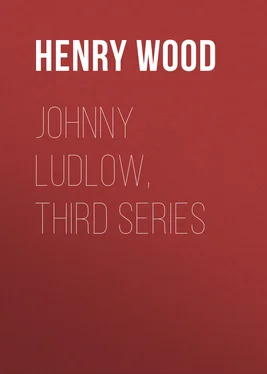Henry Wood - Johnny Ludlow, Third Series
Здесь есть возможность читать онлайн «Henry Wood - Johnny Ludlow, Third Series» — ознакомительный отрывок электронной книги совершенно бесплатно, а после прочтения отрывка купить полную версию. В некоторых случаях можно слушать аудио, скачать через торрент в формате fb2 и присутствует краткое содержание. Жанр: foreign_prose, literature_19, foreign_antique, на английском языке. Описание произведения, (предисловие) а так же отзывы посетителей доступны на портале библиотеки ЛибКат.
- Название:Johnny Ludlow, Third Series
- Автор:
- Жанр:
- Год:неизвестен
- ISBN:нет данных
- Рейтинг книги:4 / 5. Голосов: 1
-
Избранное:Добавить в избранное
- Отзывы:
-
Ваша оценка:
- 80
- 1
- 2
- 3
- 4
- 5
Johnny Ludlow, Third Series: краткое содержание, описание и аннотация
Предлагаем к чтению аннотацию, описание, краткое содержание или предисловие (зависит от того, что написал сам автор книги «Johnny Ludlow, Third Series»). Если вы не нашли необходимую информацию о книге — напишите в комментариях, мы постараемся отыскать её.
Johnny Ludlow, Third Series — читать онлайн ознакомительный отрывок
Ниже представлен текст книги, разбитый по страницам. Система сохранения места последней прочитанной страницы, позволяет с удобством читать онлайн бесплатно книгу «Johnny Ludlow, Third Series», без необходимости каждый раз заново искать на чём Вы остановились. Поставьте закладку, и сможете в любой момент перейти на страницу, на которой закончили чтение.
Интервал:
Закладка:
Nothing further was heard for a minute. Then Thomas spoke. “Has the man here been seen talking with young women?”
“Who is to know? They take care not to be seen; that’s their craft. And so you see, Thomas, I’d rather steer clear of the man, and not give him the opportunity of trying his arts on me. I can tell him it’s not Hannah Baber that would be cajoled off to a barbarous desert by a man who had fifteen other wives beside! Lord help the women for geese! Miss Lena” (raising her voice), “don’t you tear about after the fawn like that; you’ll put yourself into a pretty heat.”
“I’d look him up when I came home, if I were the Squire,” said Thomas, who evidently took it all gravely in. “We don’t want a Mormon on the place.”
“If he were not a Mormon, which I’m pretty sure he is, I should say he was a kidnapper of children,” went on Hannah. “After we had got past him over so far, he managed to ’tice Hugh back to the stile, gave him a sugar-stick, and said he’d take him away if he’d go. It struck me he’d like to kidnap him.”
Tod, sitting at the foot of the table in the Squire’s place, had listened to all this deliberately. Mrs. Todhetley, opposite to him, her back to the light, had tried, in a feeble manner, once or twice, to drown the sounds by saying something. But when urgently wanting to speak, we often can’t do so; and her efforts died away helplessly. She looked miserably uncomfortable, and seemed conscious of Tod’s feeling in the matter; and when Hannah wound up with the bold assertion touching the kidnapping of Hugh, she gave a start of alarm, which left her face white.
“Who is this man that shows himself in the neighbourhood?” asked Tod, putting the question to her in a slow, marked manner, his dark eyes, stern then, fixed on hers.
“Johnny, those cherries don’t look ripe. Try the summer apples.”
It was of no use at any time trying to put aside Tod. Before I had answered her that the cherries were ripe enough for me, Tod began at her again.
“Can you tell me who he is?”
“Dear me, no,” she faintly said. “I can’t tell you anything about it.”
“Nor what he wants?”
“No. Won’t you take some wine, Joseph?”
“I shall make it my business to inquire, then,” said Tod, disregarding the wine and everything else. “The first time I come across the man, unless he gives me a perfectly satisfactory answer as to what he may be doing here on our land, I’ll horse-whip him.”
Mrs. Todhetley put the trembling fingers of her left hand into the finger-glass, and dried them. I don’t believe she knew what she was about more than a baby.
“The man is nothing to you, Joseph. Why should you interfere with him?”
“I shall interfere because my father is not here to do it,” he answered, in his least compromising of tones. “An ill-looking stranger has no right to be prowling mysteriously amongst us at all. But when it comes to knocking at windows at night, to waylaying—people—in solitary places, and to exciting comments from the servants, it is time some one interfered to know the reason of it.”
I am sure he had been going to say you ; but with all his prejudice he never was insolent to Mrs. Todhetley, when face to face; and he substituted “people.” Her pale blue eyes had the saddest light in them you can well conceive, and yet she tried to look as though the matter did not concern her. Old Thomas came in with the folded damask slips, little thinking he and Hannah had been overheard, put them in the drawer, and set things straight on the sideboard.
“What time tea, ma’am?” he asked.
“Any time,” answered Mrs. Todhetley. “I am going over to Mr. Coney’s, but not to stay. Or perhaps you’ll go for me presently, Johnny, and ask whether Mrs. Coney has come home,” she added, as Thomas left the room.
I said I’d go. And it struck me that she must want Mrs. Coney very particularly, for this would make the fifth time I had gone on the same errand within a week. On the morning following that rapping at the window, Mrs. Coney had news that Mrs. West, her married daughter, was ill, and she started at once by the rail to Worcester to visit her.
“I think I’ll go and look for the fellow now,” exclaimed Tod, rising from his seat and making for the window. But Mrs. Todhetley rose too, as one in mortal fright, and put herself in his way.
“Joseph,” she said, “I have no authority over you; you know that I have never attempted to exercise any since I came home to your father’s house; but I must ask you to respect my wishes now.”
“What wishes?”
“That you will refrain from seeking this stranger: that you will not speak to or accost him in any way, should you and he by chance meet. I have good reasons for asking it.” Tod stood stock-still, neither saying Yes nor No; only biting his lips in the anger he strove to keep down.
“Oh, very well,” said he, going back to his seat. “Of course, as you put it in this light, I have no alternative. A night’s delay cannot make much difference, and my father will be home to-morrow to act for himself.”
“You must not mention it to your father, Joseph. You must keep it from him.”
“I shall tell him as soon as he comes home.”
“Tell him what? What is it that you suspect? What would you tell him?”
Tod hesitated. He had spoken in random heat; and found, on consideration, he was without a case. He could not complain to his father of her : in spite of his hasty temper, he was honourable as the day. Her apparent intimacy with the man would also tie his tongue as to him , whomsoever he might be.
“You must be quite aware that it is not a pleasant thing, or a proper thing, to have this mysterious individual encouraged here,” he said, looking at her.
“And you think I encourage him, Joseph?”
“Well, it seems that you—that you must know who he is. I saw you talking with him one day in the Ravine,” continued Tod, disdaining not to be perfectly open, now it had come to an explanation. “Johnny was with me. If he is a relative of yours, why, of course–”
“He is no relative of mine, Joseph.” And Tod opened his eyes wide to hear the denial. It was the view he had taken all along.
“Then why do you suffer him to annoy you?—and I am sure he does do it. Let me deal with him. I’ll soon ascertain what his business may be.”
“But that is just what you must not do,” she said, seeming to speak out the truth in very helplessness, like a frightened child. “You must leave him in my hands, Joseph: I shall be able, I dare say, to—to—get rid of him shortly.”
“ You know what he wants?”
“Yes, I am afraid I do. It is quite my affair; and you must take no more notice of it: above all, you must not say anything to your father.”
How much Tod was condemning her in his heart perhaps he would not have cared to tell; but he could but be generous, even to his step-mother.
“I suppose I must understand that you are in some sort of trouble?”
“Indeed I am.”
“If it is anything in which I can help you, you have only to ask me to do it,” he said. But his manner was lofty as he spoke, his voice had a hard ring in it.
“Thank you very much, Joseph,” was the meek, grateful answer. “If you will only take no further notice, and say nothing to your father when he comes home, it will be helping me sufficiently.”
Tod strolled out; just as angry as he could be; and I ran over to the farm. Jane Coney had received a letter from her mother by the afternoon post, saying she might not be home for some days to come.
“Tell Mrs. Todhetley that I am sorry to have to send her bad news over and over again,” said Jane Coney, who was sitting in the best kitchen, with her muslin sleeves turned up, and a big apron on, stripping fruit for jam. The Coneys had brought up their girls sensibly, not to be ashamed to make themselves thoroughly useful, in spite of their education, and the fair fortune they would have. Mary was married; Jane engaged to be. I sat on the table by her, eating away at the fruit.
Читать дальшеИнтервал:
Закладка:
Похожие книги на «Johnny Ludlow, Third Series»
Представляем Вашему вниманию похожие книги на «Johnny Ludlow, Third Series» списком для выбора. Мы отобрали схожую по названию и смыслу литературу в надежде предоставить читателям больше вариантов отыскать новые, интересные, ещё непрочитанные произведения.
Обсуждение, отзывы о книге «Johnny Ludlow, Third Series» и просто собственные мнения читателей. Оставьте ваши комментарии, напишите, что Вы думаете о произведении, его смысле или главных героях. Укажите что конкретно понравилось, а что нет, и почему Вы так считаете.












